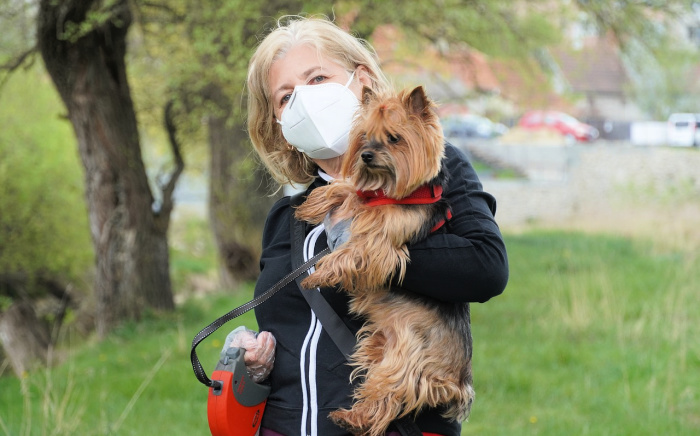With so much disinformation swirling around the topic of COVID-19, we decided to find the definitive answer to the question, “Can dogs get COVID-19?” According to the Center for Disease Control (CDC), they can, but it’s rare. Here’s what the CDC wants us to know.
The risk is considered to be low
- A small number of pets worldwide, including cats and dogs, have been reported to be infected with the virus that causes COVID-19, mostly after close contact with people with COVID-19.
- Based on the limited information available to date, the risk of animals spreading COVID-19 to people is considered to be low.
- It appears that the virus that causes COVID-19 can spread from people to animals in some situations.
- Treat pets as you would other human family members – do not let pets interact with people outside the household.
- If a person inside the household becomes sick, isolate that person from everyone else, including pets.
- This is a rapidly evolving situation and information will be updated as it becomes available.
Risks of people spreading the virus to pets
We are still learning about the virus that causes COVID-19, but it appears that it can spread from people to animals in some situations. A small number of pets worldwide, including cats and dogs, have been reported to be infected with the virus that causes COVID-19, mostly after close contact with people with COVID-19.
Infected pets might get sick or they might not have any symptoms. Of the pets that have gotten sick, most only had mild illness and fully recovered.
What to do if you have pets
Until we learn more about how this virus affects animals, treat pets as you would other human family members to protect them from a possible infection.
Because there is a risk that people with COVID-19 could spread the virus to animals, CDC recommends that pet owners limit their pet’s interaction with people outside their household.
- Keep cats indoors when possible and do not let them roam freely outside.
- Pets or other animals should not be allowed to roam freely around the facility, and cats should be kept indoors.
- Avoid public places where a large number of people gather.
-
Do not put a mask on pets. Masks could harm your pet.
There is no evidence that the virus can spread to people from the skin, fur, or hair of pets. Do not wipe or bathe your pet with chemical disinfectants, alcohol, hydrogen peroxide, or other products, such as hand sanitizer, counter-cleaning wipes, or other industrial or surface cleaners. Talk to your veterinarian if you have questions about appropriate products for bathing or cleaning your pet.
Talk to your veterinarian if your pet gets sick or if you have any concerns about your pet’s health.
Protect pets if you are sick
If you are sick with COVID-19 (either suspected or confirmed by a test), you should restrict contact with your pets and other animals, just like you would with people. Until we know more about this virus, people sick with COVID-19 should avoid contact with pets and other animals.
- When possible, have another member of your household care for your pets while you are sick.
- Avoid contact with your pet including petting, snuggling, being kissed or licked, sharing food, and sleeping in the same bed.
- If you must care for your pet or be around animals while you are sick, wear a mask and wash your hands before and after you interact with them. (Find everything from utilitarian to high-fashion masks on Amazon.)
If you are sick with COVID-19 and your pet becomes sick, do not take your pet to the veterinary clinic yourself. Call your veterinarian and let them know you have been sick with COVID-19. Some veterinarians may offer telemedicine consultations or other plans for seeing sick pets. Your veterinarian can evaluate your pet and determine the next steps for your pet’s treatment and care.
Stay healthy around animals
In the United States, there is no evidence that animals are playing a significant role in the spread of COVID-19. Based on the limited information available to date, the risk of animals spreading COVID-19 to people is considered to be low. However, because all animals can carry germs that can make people sick, it’s always a good idea to practice healthy habits around pets and other animals.
- Wash your hands after handling animals, their food, waste, or supplies.
- Practice good pet hygiene and clean up after pets properly.
- Talk to your veterinarian if you have questions about your pet’s health.
- Be aware that children 5 years of age and younger, people with weakened immune systems, and older adults are more likely to get sick from germs some animals can carry.
Monitor your pet’s symptoms
It is important to keep track of your pet’s symptoms during home isolation. If you think your pet has new symptoms or is getting worse, call your veterinarian.
Pets sick with COVID-19 may have:
- Fever
- Coughing
- Difficulty breathing or shortness of breath
- Lethargy (unusual laziness or sluggish)
- Sneezing
- Runny nose
- Eye discharge
- Vomiting
- Diarrhea
Follow all care instructions from your veterinarian. Your veterinarian may have you keep a written log of your pet’s symptoms.
If your pet develops new symptoms or seems to be getting worse, including trouble breathing, you should call your veterinarian right away. Your veterinarian may be able to advise you over the phone or may tell you to bring your pet to their clinic or go to another clinic that can better care for your pet.
What to do if your pet tests positive for COVID-19
- If your pet tests positive for the virus that causes COVID-19, isolate the pet from everyone else, including other pets.
- Do not wipe or bathe your pet with chemical disinfectants, alcohol, hydrogen peroxide, or other products, such as hand sanitizer, counter-cleaning wipes, or other industrial or surface cleaners.
- Only a few pets have been confirmed to be infected with the virus that causes COVID-19. Some pets did not show any signs of illness, but those pets that did get sick all had mild disease that could be taken care of at home. None have died from the infection.
- If you think your pet has COVID-19, call a veterinarian first to discuss what you should do.
- Pets with confirmed infection with the virus that causes COVID-19 should be restricted to isolation in the home until a veterinarian or public health official has determined that they can be around other pets and people.
Protect yourself when caring for a sick pet
- Follow similar recommendations as for people caring for an infected person at home.
- If you are at higher risk for severe illness from COVID-19, another household member should care for the pet, if possible.
- People should wear a mask and gloves in the same room or area as the sick pet.
-
Animals should not wear a mask. Do not try to put a mask on your pet.
-
- Use gloves when handling the pet’s dishes, toys, or bedding and when picking up feces (poop). Throw out gloves and place waste material or litterbox waste in a sealed bag before throwing away in a trashcan lined with a trash bag. Always wash your hands with soap and water immediately after cleaning up after your pet.
- Clean your hands regularly throughout the day.
- Wash hands: Wash your hands often with soap and water for at least 20 seconds each. Make sure everyone in the home does the same, especially after touching the sick pet or handling their dishes, toys, or bedding.
- Hand sanitizer: If soap and water are not readily available, use a hand sanitizer that contains at least 60% alcohol. Cover all surfaces of your hands and rub them together until they feel dry.
- Do not touch your eyes, nose, and mouth with unwashed hands.
- Clean and then disinfect:
- Follow cleaning and disinfecting recommendations found on CDC’s Cleaning and Disinfecting Your Home
- Do not wipe or bathe your pet with chemical disinfectants, alcohol, hydrogen peroxide, or other products, such as hand sanitizer, counter-cleaning wipes, or other industrial or surface cleaners. There is no evidence that viruses, including the virus that causes COVID-19, can spread to people or other animals from the skin, fur, or hair of pets. Using chemical disinfectants on your pet could make them very sick or kill them. Talk to your veterinarian if you have questions about appropriate products for bathing or cleaning your pet.
For more information, visit CDC’s COVID-19 and Animals webpage and Healthy Pets, Healthy People website.



